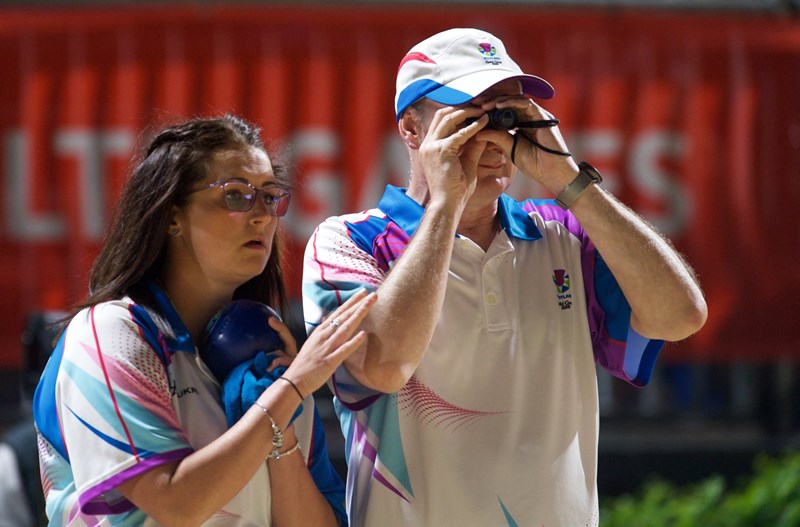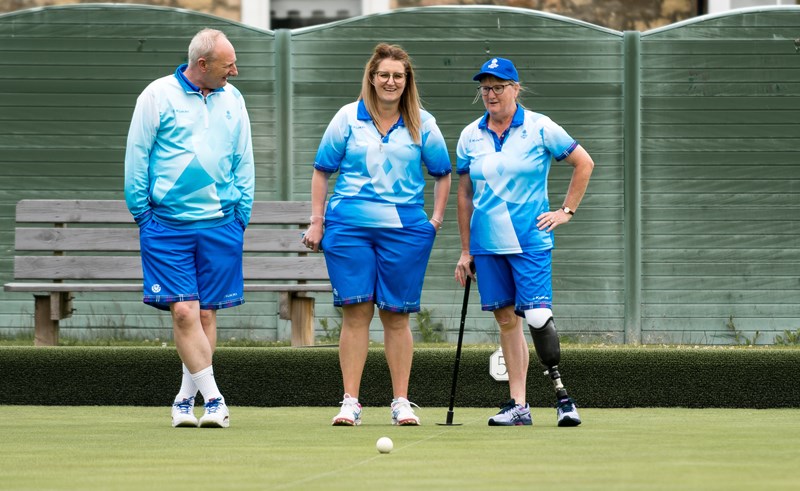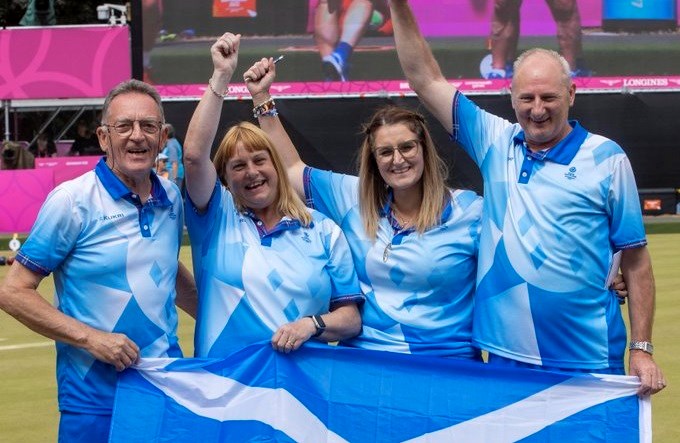Sarah Jane Ewing a gold medal story
As December brings 2022 to a close we can’t help but look back on the success of our para athletes at this years’ Commonwealth Games. We spoke with Sarah Jane Ewing, Director for Robert Barr in the Para Mixed Pairs B2/B3 at Birmingham to find out more about her gold medal story.
Sarah’s first experience of a Commonwealth Games was in 2010 when she attended the event in Delhi as part of the Team Scotland Achieve Programme, which selects young, stars of the future to experience a multi-sport event and gain valuable athlete insight. This helped Sarah prepare for her Games debut in 2018 when the visually impaired pairs suffered a heart-breaking bronze playoff defeat. Our Q&A with Sarah explains how her strong relationship with Robert enabled them to bounce back to gold medal glory this year going undefeated in their 7 matches alongside teammates Melanie Inness and George Miller.
Q) Describe your experience at Birmingham 2022 this year, how did this differ to Gold Coast in 2018 and how has your relationship with Robert developed over this time?
A) “Birmingham was surreal, there was not many emotions myself and the team did not experience this summer. It was a pleasure to compete as part of the para-disciplines. Everything came together at the right time on the greens, Mel, George and Robert were exceptional.
“Birmingham was like a home Games for us. We had practiced on the greens at Victoria Park several times this year and in 2019, but more importantly we had a large support of our family, friends, para squad members and many supportive Scots behind us in the crowd. The same numbers were not there in Australia but they supported from afar. Having them there was great - we wouldn’t have had the same success without them.
“I was first partnered with Robert Barr in 2017 for the multi nations in Broadbeach, where with Irene Edgar and David Thomas we achieved a silver medal. The Gold Coast Games in 2018 was an amazing but painful experience having lost out in the bronze medal match in an extra end. It was heart- breaking and took a long time to come to terms with as we as a team worked so hard to get there and we left all we could on that green on that evening. We were not only disappointed personally, but we were mainly disappointed for all our supporters and everyone who worked so hard with us.

“In Birmingham, Robert and I were determined not to be in that position once again, we had a full appreciation of the fine margins between being on the podium and watching a medal ceremony from the side lines.
“My relationship with Robert has only strengthened because of these experiences. The Gold Coast was tough, but we had each other to talk to about it. Robert is a dedicated professional, he is a great person to work with. We have a relationship based on trust, honesty, and respect of each other which works very well on and off the green however we are not afraid to challenge each other too! It meant the world to me to finally see Robert on the podium, at last!
“The relationships between all the para team are very strong, we are all there supporting each other at the Games and at all events before, there is great camaraderie in the team- we celebrate wins and analyse our losses together. They are all a family of sorts, an achievement for one is an achievement shared by them all. All the para squad are keen to highlight the inclusivity of our sport, so every success is an opportunity to do this.
“It’s a team, I am extremely proud to be part of. Seeing the men, then the ladies win gold at the Games certainly applied pressure on us to deliver. We were delighted to cheer all of Team Scotland on throughout the tournament and it was great to see them all in the crowd when I had the privilege to share a podium with Melanie, George and Robert.”
Q) As you also were also part of the Delhi Achieve programme, tell us what the Commonwealth Games means to you?
A) “I was lucky enough to travel to Delhi as part of the ‘Achieve 2014’ programme to experience a Commonwealth Games without the pressure of competing. I am still very grateful for this experience seeing a multi-sport event set up, village life etc and high-performance bowls. In hindsight, this opportunity set me up to compete in the supporting role I do. I was able to pass on the knowledge, I had from this experience and enter a Games in 2018 not overwhelmed by everything and allowed me to concentrate on supporting Robert at his first games and the rest of the para team.”
Q) Describe your role as a director…
A) “My role as a director is to support the visually impaired athlete on and off the green. On the green, I am the players eyes on the rink, I support with discussions on shot selection, communication of the position of bowls in the head, technical assistance, and general rink duties on behalf of the VI players. A director must have a good relationship with the players as trust is vital. They trust the advice and judgement I deliver however the player always has the final call on the shot played. I need to engage and encourage the players, promote confidence and be firm, fair, and supportive.
“Off the green, I aid the players when they may need assistance during travelling/training/events and village life using the CWG as an example. It’s important a director and a player interact away from the greens, a friendly chat when there is downtime to distract from the pressures of competition always helps the relationship on the greens too!”

Q) When did you first take on this role and why?
A) “I first took on the role of director in 2011 during the IBD world championships in South Africa. I was part of the coaching and support team however during the demanding schedule and game clashes I was required to step on the green as a director. Learning the appropriate rules, clock notation, level of support required by the players all at the same time as concentrating on the game, opponents and supporting play it was a steep but enjoyable learning curve. Prior to the 2014 CWG, I was director to Maria Spenser from Dunfermline. Maria is a great bowler; I learned a significant amount about directing from Maria and she was a pleasure to compete with. In 2015, Maria won Gold in the B3 ladies World Championships and achieved a silver medal in the mixed pairs with myself as her director.”
Q) You’ve represented Scotland at Junior and Senior level and this season retained the West Fife ladies singles title – how do you find balancing your own bowling career with directing and work/family etc?
A) “To be honest, it’s very difficult balancing everything - full time work, my own bowling commitments, para commitments and family. Sacrifices must be made – mainly social, it is a good job I have very understanding, patient and supportive family, friends and colleagues. My experience competing in mainstream bowls at international level has given me confidence and the technical knowledge of the game which importantly can be applied to directing – shot selection and tactics are vital in the game at High Performance level.”
What is your favourite thing about bowls?
A) “Bowls is truly inclusive, and I am proud to be part of such a sport – I can go on the green and compete with Robert and Melanie on equal terms. It is a sport for everyone. The success of all three para teams at the 2022 games are from years of hard work by everyone involved and I hope that this can inspire others to take part.”

Thanks to Sarah for sharing her gold medal story with us. If this Q&A has inspired you to consider learning more about para bowls and becoming a director, Bowls Scotland’s Inclusive Coaching Course gives a brilliant introduction to the clock notation and other aspects that Sarah has mentioned. There are a number of inclusive courses running in the new year, visit our annual calendar to find out more.